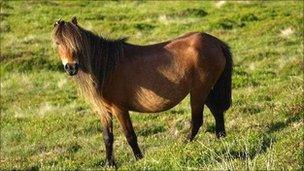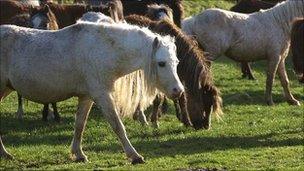Fear for Snowdonia ponies over ban on ear notches
- Published

There are nine members of the Cymdeithas Merlod y Carneddau, who own the ponies
Pony-owning hill farmers say they fear a ban on ear notches could spell the end of their Snowdonia breed.
The matter came to light after the Carneddau ponies' ear markings were shown on BBC TV's Countryfile.
The British Veterinary Association (BVA) says the notching is illegal and it wants the ponies micro-chipped.
The Welsh Assembly Government has given the Carneddau ponies exemption from microchipping. The society will meet on Wednesday to discuss the next step.
Gareth Jones, secretary of Cymdeithas Merlod y Carneddau (Carneddau Pony Society), said the first any of its nine members had heard of the change in ear notching was when he received a phone call from the BVA.
"We haven't tagged for years, although some tags remain on the older horses, but the notches have been used for generations," he said.
Mr Jones said his family's marks were "small cuts" on the ears which had been used in a particular pattern for 300 years.
"These are wild ponies and you can't get close to them to scan them... and really you want to handle them as little as possible."
He said the association was meeting on Wednesday to discuss the way forward.
"The BVA man said it was mutilating the ears, but people have piercings and tattoos.

The ponies are brought down from the mountain for a health check once a year
"I feel that having ponies on the mountain that no-one can tell who owns them, is more cruel," he added.
Following the TV programme the BVA said it was asking its members to remind horse and pony-owning clients that ear tagging and ear notching were not permitted under the Animal Welfare Act.
Since July there has been a legal requirement that all horses and ponies are permanently identified by microchip, with some small exceptions.
The BVA said it believed this removed the need for any other form of identification, such as ear-marking and hot branding, even for wild horses and ponies.
Harvey Locke, president of the British Veterinary Association (BVA), said it was a "simple fact of legality" and it appeared there was "widespread ignorance of the rules" among those taking part in the programme.
"As veterinary surgeons we have a responsibility to work with clients to ensure they are complying with animal health and welfare legislation," he added.
"Ear mutilations are not permitted and we must make sure that message is reaching horse and pony owners," he said.
Mr Locke said the BVA would also be contacting those responsible for enforcing the legislation relating to ear mutilations in horses and ponies to make sure the law was being policed.
Handling facilities
A spokesperson for Countryfile said: "We are grateful to the BVA for bringing this to our attention and we hope to clarify the point in a future programme."
The assembly government said alternative ways of identifying animals were allowed.
"It is recognised that owners of the ponies on the Carneddau common need to identify their animals, owners and keeper of animals have a responsibility and a duty of care towards their animals," said a spokesperson.
"Keepers would be expected to recognise their animals from other's horses. The programme highlighted the need for the ponies to be inspected and examined and the gathering provides the opportunity for the owners to prepare appropriate handling facilities to comply with legal requirements."